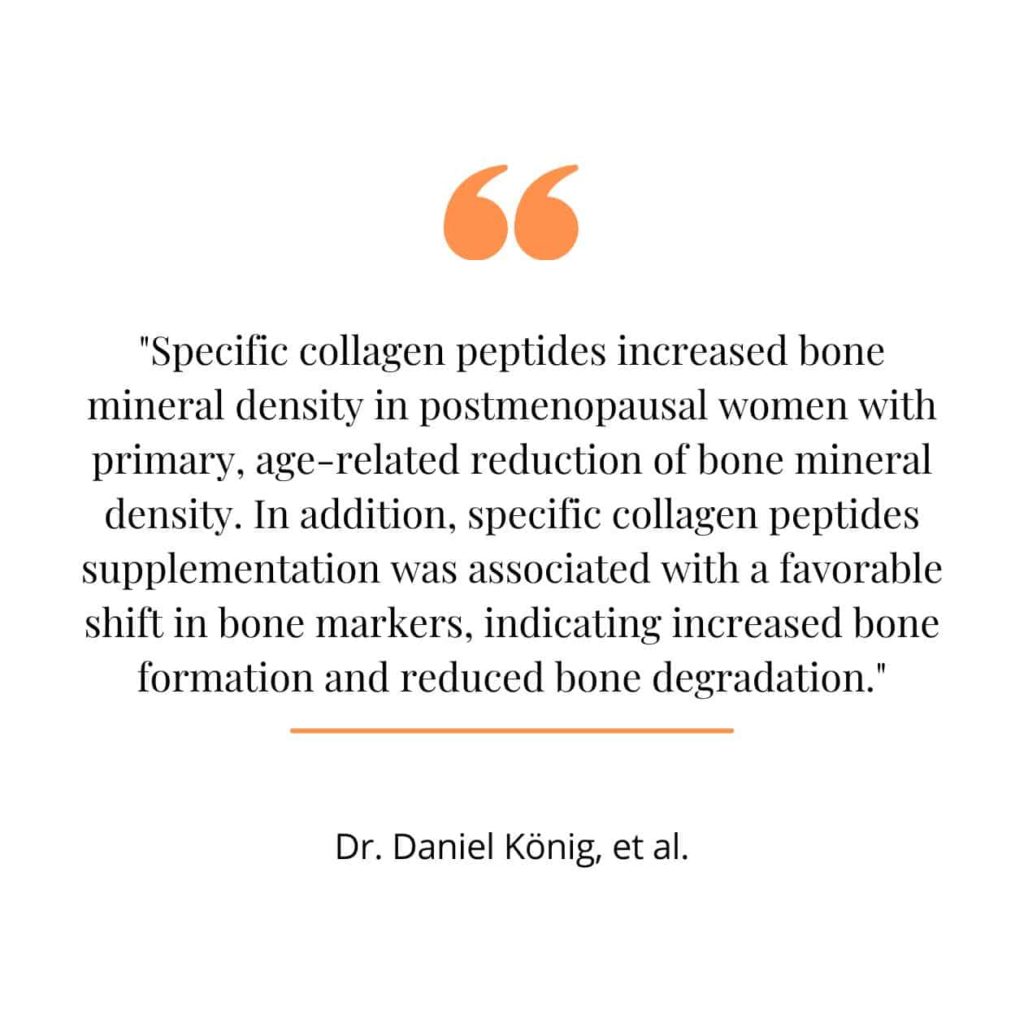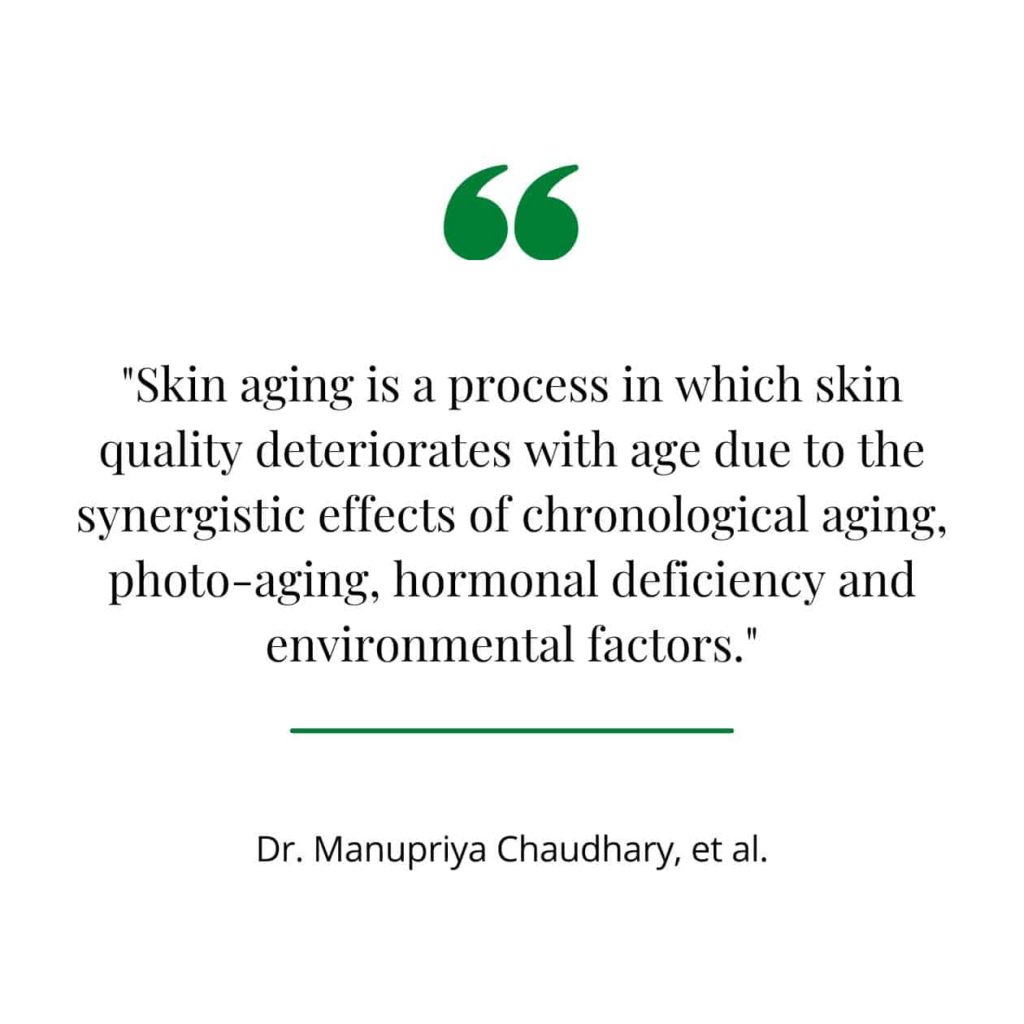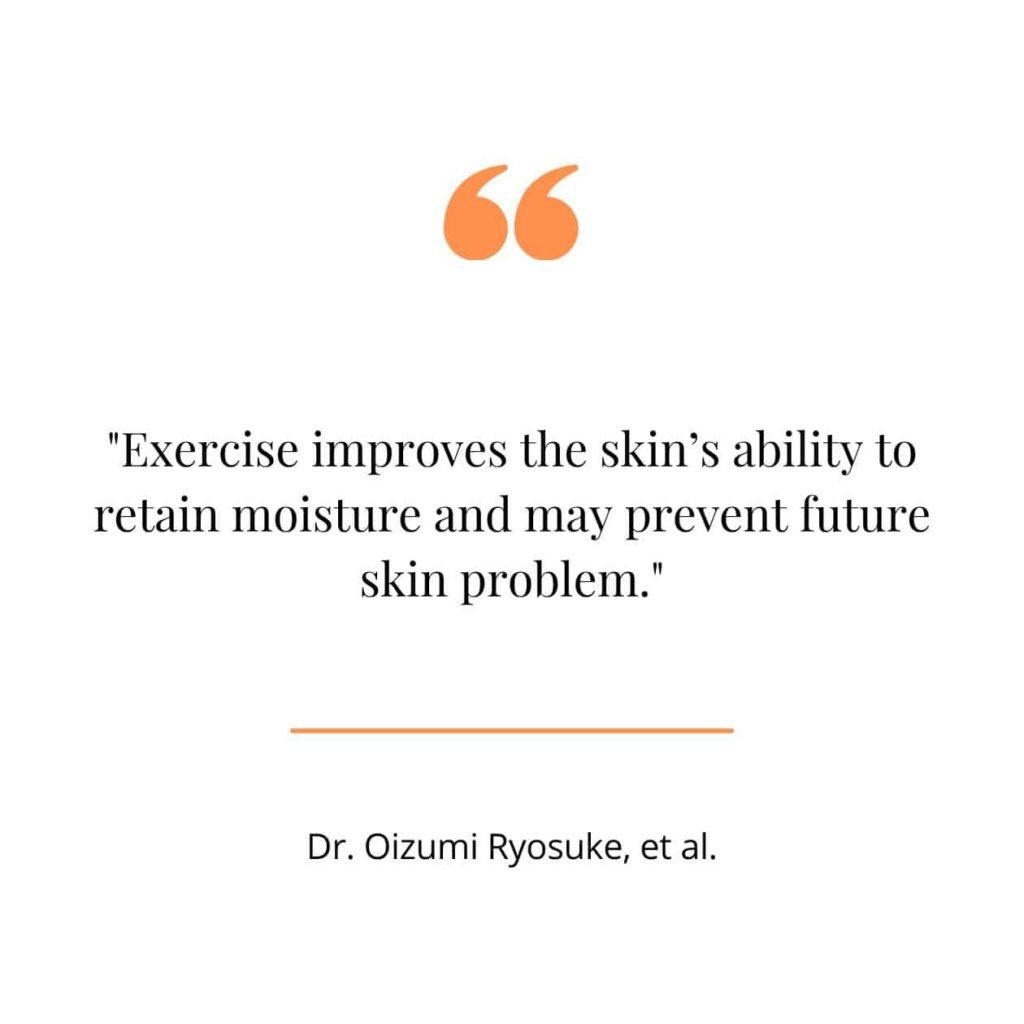True or False: Collagen Can Reverse Sagging Skin
“Collagen is what keeps our skin from sagging, giving us that plump, youthful look. Starting in our mid-20s, we slowly begin to lose collagen. For women, we can lose up to 30% of our collagen production in the first 5 years of menopause.”
Dr. Ohara Aivaz, Collagen for Your Skin: Healthy or Hype?
There is a lot of debate surrounding whether or not collagen can reverse sagging skin. Some experts believe that collagen supplements can help to improve the appearance and elasticity of the skin, while others argue that this type of treatment is ineffective or even harmful.
To determine whether collagen can effectively reverse sagging skin, it’s important to understand what collagen is and how it affects the skin. That’s exactly what we’ll cover in this article to help you gain a better understanding of all things collagen and hopefully answer the question: can collagen reverse sagging skin?
What exactly is collagen?

Collagen is a naturally occurring protein that can be found throughout the body, including in our skin. It plays an important role in helping to maintain the structure and elasticity of our skin.
As we age, however, collagen production can slow down and can result in sagging skin, fine lines, and other signs of aging.
Collagen’s Role in the Body
In addition to its role in maintaining the structure and elasticity of our skin, collagen is also responsible for providing support to other tissues in the body, including tendons, ligaments, and bones. It’s even been shown to play a role in gut health.
When it comes to our skin specifically, collagen works to help keep the skin hydrated, plump, and firm. As our collagen levels decrease with age or as a result of sun damage or other environmental factors, however, this can lead to the appearance of sagging skin.
Can collagen reverse sagging skin?

Now that we know a little bit more about collagen and its role in the body, let’s take a look at whether or not collagen can actually help to reverse sagging skin.
There’s no major studies that have been done to effectively prove that collagen and collagen supplements can help improve the look and feel of your skin. However, there are plenty of correlations linked to the two!
Many people who begin taking collagen supplements have noticed a difference in the texture and elasticity of their skin in just a few weeks. There have even been studies that suggest that collagen can help to reduce the appearance of wrinkles.
While there is no scientific evidence to support the claim that collagen can directly reverse sagging skin, it’s possible that the protein can help to improve the overall appearance of your skin, making it appear firmer and more elastic.
What do collagen peptides do?
Collagen peptides are a type of protein that can be found in collagen supplements. These peptides can be easily absorbed and broken down by the body, which helps to promote healthy, glowing skin.
The peptides help to promote the production of collagen, which can help to reduce the appearance of wrinkles and sagging skin. They can also help to improve the overall appearance of your skin, making it appear plumper and more hydrated.
Do collagen supplements work?

While collagen supplements haven’t been clinically proved to directly reverse sagging skin, they can help to improve the appearance of your skin by promoting collagen production and providing other benefits.
If you’re looking for a way to keep your skin looking young and healthy, collagen peptides may be the right choice for you.
Other Benefits of Collagen
In addition to the potential benefits for your skin, collagen can also provide other health benefits. For instance, collagen has been shown to help improve digestive health, joint pain, and bone density.
Joint pain
Collagen is a protein that plays a crucial role in the structure of various connective tissues in the body, including joints, tendons, ligaments, and cartilage.
Joint pain often arises from wear and tear on these tissues, which can occur due to aging, injury, or certain medical conditions.
Collagen supplementation is believed to benefit joint health and potentially alleviate joint pain.
Bone density

As we age, our bones can start to become weaker and more brittle. Collagen can help to improve bone density and reduce the risk of fractures.
When should I take collagen: morning or night?
There isn’t a definitive answer to this question, as the best time to take collagen can vary from person to person.
Some people may find that taking collagen in the morning can help them feel more energized throughout the day, while others may prefer to take it at night so that their body can better focus on repairing itself while they sleep.
In general, it’s best to take your collagen supplements at a time that you’ll remember to do it every day. Consistency is key when you’re looking for the best results!
Why does skin sag?
There are several factors that contribute to sagging skin. Here are some of the main culprits:
Aging

As we age, our skin cells begin to break down and produce less collagen. This can lead to wrinkles, fine lines, and, of course, sagging skin.
Weight loss
When you lose weight, your skin can sometimes have a hard time bouncing back. This is because the skin cells have been stretched out and are no longer able to support the same amount of weight.
Pregnancy

During pregnancy, the skin can stretch out due to the added weight of the baby. This can often lead to sagging skin, especially in areas like the abdomen, breasts, and thighs.
Illness
Certain illnesses can cause the skin to become weak and loose. This can include conditions like cancer, diabetes, and thyroid problems.
Ehlers-Danlos syndrome

Ehlers-Danlos syndrome is a condition that can cause the skin to become lax and stretchy. This can often lead to sagging skin, as well as other problems like joint pain and easy bruising.
How can I prevent sagging skin from aging?
Sagging skin can be a huge issue for many people, especially as they get older.
While collagen supplements won’t magically make your skin feel like a baby’s bottom, they can help to improve the appearance of your skin by promoting collagen production and providing other benefits.
Here are a few ways you can combat the inevitable sagging skin of aging:
Exercise

Maintaining a healthy lifestyle can help to keep your skin looking young and firm. Try incorporating regular exercise into your routine, as this can help to strengthen the muscles that support your skin.
Be sure that as you’re exercising more, you’re also staying hydrated. As well as keeping you going, hydration can aid in keeping your skin looking supple and vibrant.
Supplements
As well as exercise, there are a few supplements that can help to improve the appearance of your skin. Collagen peptides are one such supplement, as they can help to support collagen production and keep your skin looking plump and healthy.
Other options include vitamin C and vitamin E, which can help to protect your skin from damage caused by free radicals.
Topical treatments

There are a number of topical treatments that can help to improve the appearance of your skin. These can include retinoids, which can help to boost collagen production, as well as hyaluronic acid, which can help to keep your skin hydrated. You can find these in the form of creams, serums, and lotions.
Lifestyle changes
Making a few simple changes can help to keep your skin looking young and vibrant.
Try to avoid exposing your skin to too much UV light, as this can cause damage that can lead to sagging and wrinkles.
You can also try incorporating foods into your diet that are rich in antioxidants, such as berries and leafy greens.
In addition, try to avoid smoking, as studies suggest that smoking can also cause damage to the skin that can lead to sagging.
The Bottom Line
When it comes to sagging skin, collagen can be a great ally. This is because collagen can help to support the skin and keep it looking plump and healthy.
However, it’s important to remember that collagen alone won’t be able to magically reverse the effects of aging.
To really combat sagging skin, you’ll need to incorporate a healthy lifestyle, including regular exercise and a balanced diet.
You can also try using topical treatments and supplements to help improve the appearance of your skin.
If you’re interested in learning more about collagen and how collagen supplements can help boost your natural production, click here to read more articles or browse our selection of clean-sourced, organic collagen products!
Organixx Clean Sourced Collagens blend contains five types of collagen from four sources. What’s more, it’s combined with targeted nutrients such as zinc, vitamin C, and vitamin B6 which specifically enhance the bioavailability and potency of collagen. Clean Sourced Collagens is formulated from the ground up to enhance and support your body’s natural ability to heal and rebuild itself from the INSIDE out.






Comments